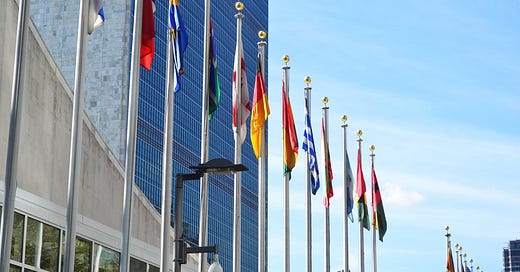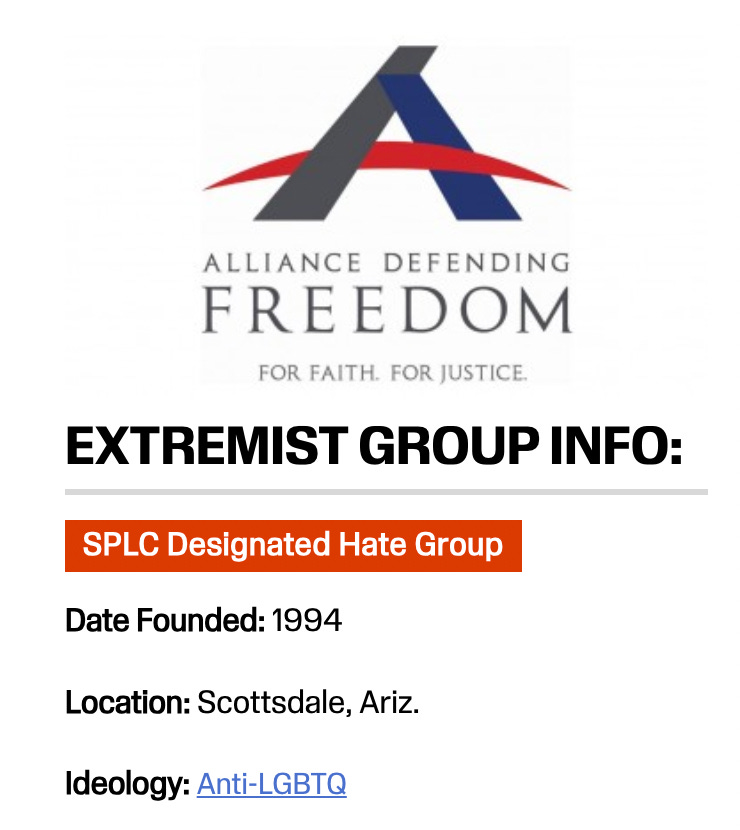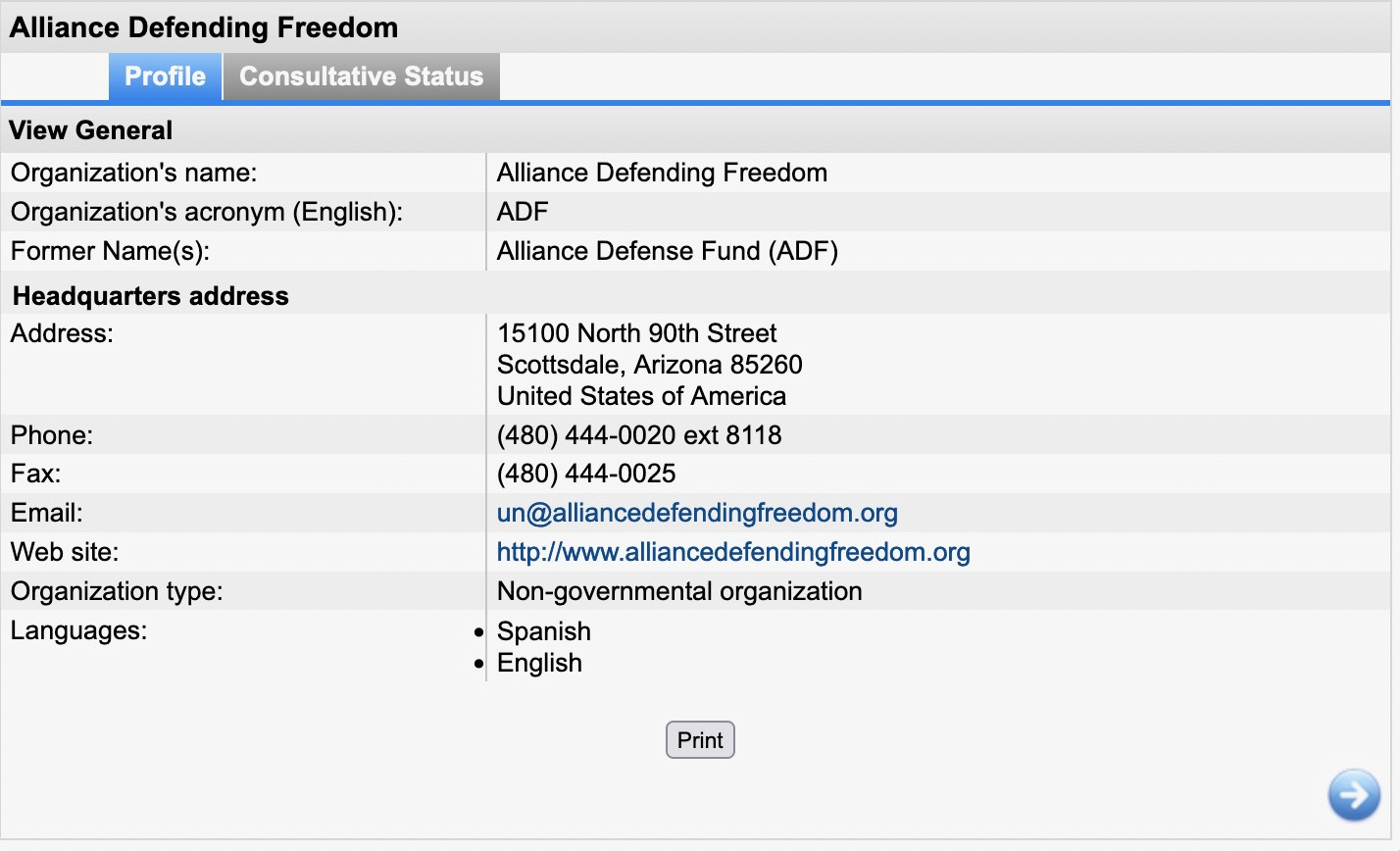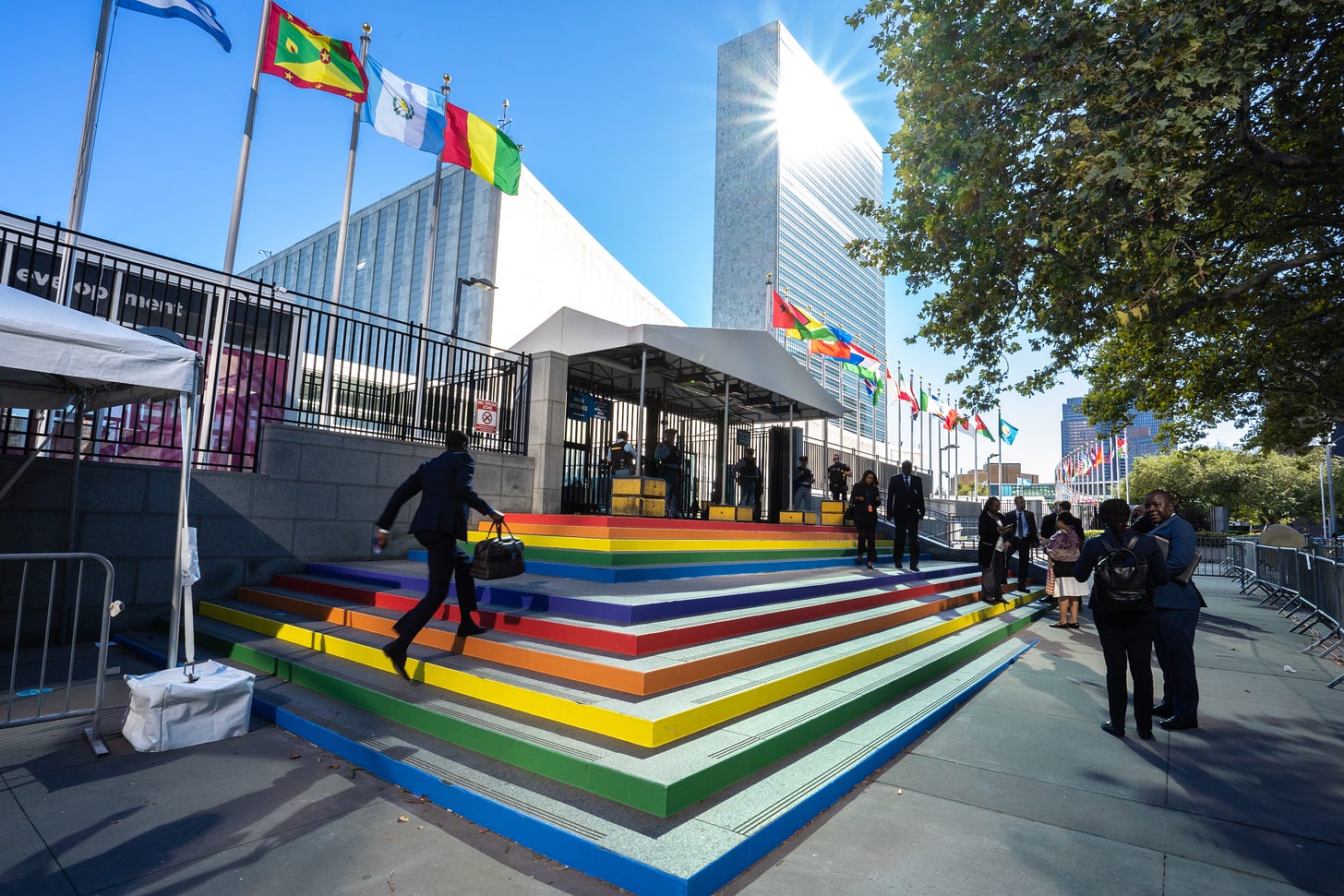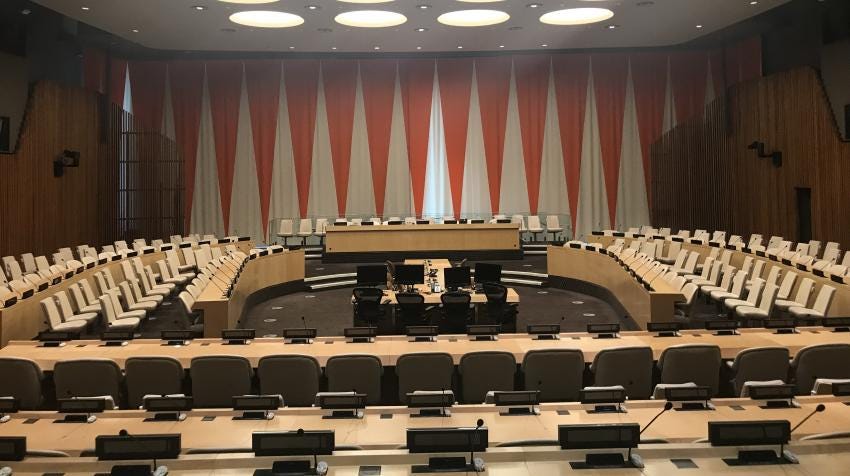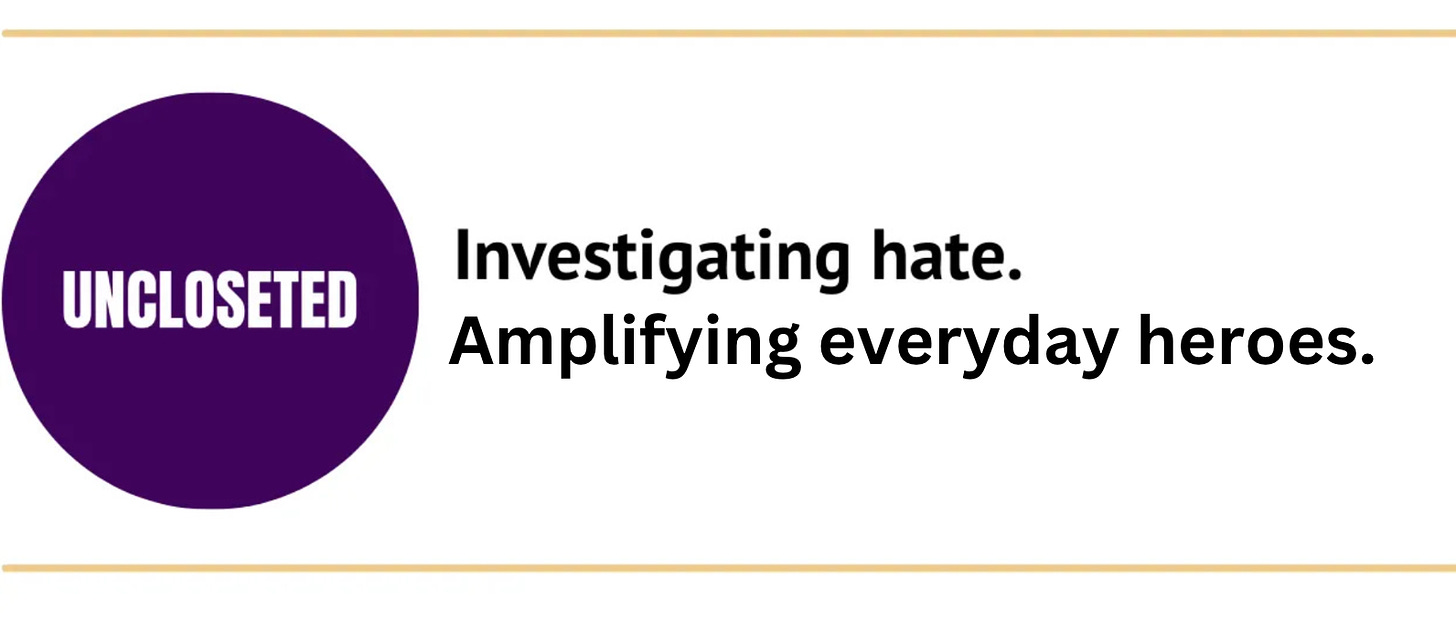Why Do At Least Six Anti-LGBTQ Hate Groups Have Special Consultative Status Inside The United Nations?
An Uncloseted Media investigation has found that at least six Southern Poverty Law Center-designated anti-LGBTQ hate groups hold what's known as Economic and Social Council consultative status.
In November of 2023 at the United Nations in New York City, the Political Network for Values held their fifth Transatlantic Summit event.
The conference was called “Affirming universal human rights: Uniting Cultures for life, family, and fundamental freedoms.” It was attended by a variety of far-right Christian groups that have historically advocated for anti-LGBTQ policies.
One of those groups is Alliance Defending Freedom. At the conference, Emilie Kao, the group’s senior counsel and vice president of advocacy strategy, took the floor to express her outrage that a Finnish doctor was put on trial for referring to homosexuality as “a developmental disorder,” “a shame and a sin” and as a form of “genetic degeneration.”
“Thank God she was unanimously acquitted,” said Kao.
Austin Ruse, president of the Center for Family and Human Rights (otherwise known as C-Fam), who has supported laws that would criminalize homosexual behavior and has also said that hard left people that run modern universities should be “taken out and shot,” spoke about some of his group’s recent accomplishments. “There is no redefinition of the family because we stopped them. Sexual orientation and gender identity has never become a category of nondiscrimination in international law, because we have stopped them,” he said.
Kao, C-Fam and ADF did not respond to requests for comment. Ruse disputed that he called for the criminalization of gay sex, saying that he was only offering "a hypothetical." He added that he has “never advocated that anyone be taken out and shot."
The access and influence of these anti-LGBTQ groups inside the UN isn’t limited to this summit. Both hold what’s known as Special Consultative status at the UN. And they’re not the only ones.
In a months-long investigation, Uncloseted Media found that at least six Southern Poverty Law Center-designated anti-LGBTQ hate groups hold this coveted status, which is granted by the UN’s Economic and Social Council.
“What's astounding is I'm not sure anybody's ever produced a list,” says Heidi Beirich, who oversaw SPLC’s annual designation of hate groups from 2012 to 2019. “These organizations have been stealthily inserting themselves into bodies whose beliefs they don't share for years,” she says.
“Many of these organizations don't even believe in the Universal Declaration of Human Rights,” she says.
Special Consultative Status—which is held by more than 5000 groups—gives members unique access to the UN and its subsidiary bodies, to the various human rights mechanisms of the organization and to special events organized by the President of the General Assembly.
The UN did not respond to repeated interview requests as well as requests for comment.
“You have access to member states, right? So I think the danger of all of this is access to the members who make decisions on resolutions. Who make UN policy,” says Gillian Kane, director of global policy and research at Ipas, a non-governmental organization that focuses on advancing gender equity and reducing the harm of U.S. foreign policy.
Kane, who attended the November Summit, says this status “legitimizes these groups” who have clear track records that conflict with the core principles of the UN, like the promotion of human rights and fundamental freedoms.
“There's nothing subtle about what they do. They hate gays and they're unapologetic to go after it,” says Kane.
Many of these groups have been around for decades, advocating against the LGBTQ community. Kao’s group, ADF, published a press release titled “ADF increases global impact with new status at United Nations” when they were granted consultative status in 2010. “ADF can now have a say when UN treaties and conventions are drafted that directly impact religious liberty and important matters related to the sanctity of life, marriage, and the family,” the release said. It goes on to say that “ADF will now be able to monitor and provide input on matters” affecting religious freedoms.
The group, which consists of hundreds of lawyers in the U.S. and around the globe, was founded in 1994 by Alan Sears, who co-authored The Homosexual Agenda: Exposing the Principal Threat to Religious Freedom Today. Since then, they have advocated at the state and federal level for laws that promote conversion therapy and that would ban gays from serving in the military. In addition, they’ve testified in favor of laws that would strip transgender folks of the right to use the bathroom that matches their gender identity, that would prevent them from changing the name on their birth certificate and that would ban their access to gender affirming healthcare.
In addition, they have been effective globally through their international arm, ADF International. In 2012 in Jamaica, they advocated for the retention of a a law that criminalizes gay sex. That law remains in effect. And in 2013, members of ADF worked to defend a Belize statute that makes anyone engaging in LGBTQ sex subject to a punishment of up to 10 years in prison.
The other groups—which include the Howard Center for Family Religion and Society (now known as International Organization for Family), Family Research Council, the Association of United Families International and the American Family Association of New York—all have similar track records.
Family Research Council has advocated in favor of conversion therapy laws and continues to publish articles that falsely assert that “sexual orientation change efforts” are effective for gay people. And Tim Wildmon, the President of the American Family Association, is currently advocating for a boycott of Target for allowing trans people to use the bathroom or dressing room that matches their gender identity.
“Please use #BoycottTarget,” Wildmon wrote in a special update on their website.
Because of these track records, Beirich felt it was “a no brainer” to add them to the SPLC’s list of hate groups alongside the Ku Klux Klan, the American Defense Skinheads and Aryan Nations.
“We put them on the hate list because they demonize the entire LGBTQ population in derogatory, dehumanizing language, just like the Klan would with Black people or Jewish people,” says Beirich, now the co-founder and chief strategy officer at the Global Project Against Hate and Extremism.
“People in the Christian right who have long demonized the LGBTQ community have political power in this country, and it's more normalized to hate queer people than to hate Black people for no damn good reason. Which is what we're talking about. So it's the biblically informed aspect of it that somehow legitimizes it,” says Beirich, who adds that she has “absolutely no idea” how these groups secured this status.
So how do these groups get here? While they all conform to basic principles required for Special Consultative Status, such as being a registered nonprofit and having specialized expertise on issues relevant to the UN, they are also expected to act in conformity with “the spirit, purposes and principles of the Charter of the United Nations,” which specifically states that members must promote and encourage respect for human rights, take action “to strengthen universal peace” and—specifically for members with consultative status—must promote policies that encourage “social progress.”
Neil Datta, the executive director for the European Parliamentary Forum for Sexual and Reproductive Rights, says part of the reason these groups are granted this status is due to overworked civil servants who work for the NGO Branch of the UN and are in charge of a preliminary screening of these applicants.
“The folks reviewing these applications are not necessarily thematic experts on anything. So they're tasked with a very dry job of processing different applications that come in, and very legitimately won't know what all of these different groups are,” he says. “Imagine you had 15 climate groups applying and one didn’t believe in climate change. It’s not necessarily that easy to understand.”
Datta says it can be even harder to identify anti-LGBTQ groups because they often operate under the guise of protecting the family or the rights of the child.
“These groups have very nice names that aren’t obviously anti-LGBTQ. And so the people reviewing these applications may not be able to pick up on some of the subtleties,” he says.
In addition, Datta says these groups use “very clever vocabulary” that sounds well meaning. But really, they are weaponizing this language to penetrate powerful institutions like the UN “In reality, they’re using religious freedom as a fig leaf for hate speech.”
“But if you know your Catholic social doctrine, then you will recognize [this vocabulary] immediately.” Datta says common dog whistles such as “common good” or “human dignity” and “in favor of life [or] of the family” are used almost exclusively to limit the human rights of others, “usually in sexuality and reproduction.”
Datta says these “codewords” are another reason these groups go unnoticed within the UN. For example, during a three hour meeting at the November Transatlantic Summit event, participants used the term “human dignity” over 30 times.
After they get through the preliminary screening by UN civil servants, their application is reviewed by the NGO Committee—which meets twice a year—to decide who they will recommend for Special Consultative Status. After review, the recommended organizations are presented to ECOSOC for their final decision.
This committee includes 19 countries, including multiple countries that have extremely hostile policies against LGBTQ people, like Algeria, where homosexual activity is punishable by up to two years in prison; and Eritrea, where homosexuality is illegal and can be punished with jail-time.
“It honestly depends on who's sitting on that committee. So if you have countries that already have anti-LGBTQ policies in place, they're going to be friendly to inviting these groups in and approving their status,” says Kane.
Once these groups officially gain this status, they use religious freedom as a justification for promoting policies and laws that limit the rights of LGBTQ people through the UN apparatus.
The UN Declaration of Human Rights does not yet explicitly protect folks who are discriminated against for their sexual orientation or gender identity. This lack of protection has given anti-LGBTQ groups leverage in their arguments to roll back the rights of LGBTQ folks.
Inside the UN, there are efforts to change this. For example, in 2019 the Office on Genocide Prevention and the Responsibility to Protect published a Strategy and Plan of Action on Hate Speech that outlines what constitutes hate speech and how to combat it. In it, they describe hate speech “as any kind of communication in speech, writing or behavior, that attacks or uses pejorative or discriminatory language with reference to a person or a group on the basis of who they are, in other words, based on their religion, ethnicity, nationality, race, color, descent, gender or other identity factor.”
Unsurprisingly, this new guidance is opposed by the anti-LGBTQ hate groups. At the Political Network for Values Transatlantic Summit in November, ADF’s Kao said current hate speech laws protect too many different groups of people and in doing so infringe on religious freedom laws. “Who can possibly know what would fall under such an expansive definition of hate?” she said. “These laws give a veto to any offended person, allowing them to censor their neighbors.”
Beirich strongly disagrees. “You can’t use religion as a foil for harming communities and tearing into their civil and human rights. I don’t care,” she says, adding that the Ku Klux Klan has weaponized religion as a means to discriminate against Black people since it was founded in 1865.
“It's one thing to live your life however you want to live it biblically inspired. It's a different thing to have that affect other people,” says Beirich. “Keep your views to yourself.”
As these groups continue to operate inside the UN, what can be done? Datta says NGOs applying for Special Consultative Status should be subject to more rigorous background checks, where an independent body thoroughly examines the track record of applicants.
“What are the positions...of these organizations and what have they actually done?” says Datta. “What other things have they done which could be seen as having undermined human rights—the UN’s Declaration of Human Rights?”
He says using an independent body for this review would reduce the potential of political influences in the decision-making process.
As for those who already have Special Consultative Status, their status can be revoked if they don’t “conform at all times to the principles governing the establishment.”
Beirich feels strongly that should happen swiftly for all six anti-LGBTQ groups that currently hold this status. “The United Nations should revoke the consultative status of people who stand opposed to the Universal Declaration. It shouldn’t stand for policies that are rolling back human rights—it’s absurd.”
If objective, nonpartisan, rigorous, LGBTQ-focused journalism is important to you, please consider making a tax-deductible donation through our fiscal sponsor, Resource Impact, by clicking this button:


